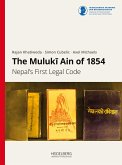The main ambition of this book lies in a detailed analysis of the formation and enforcement of Nepal's Muluki Ain of 1854, specifically focusing on the provisions regarding homicide within the Muluki Ains of 1854 and 1870. This study also examines contemporaneous legal records, revealing the complexities of the Ain's implementation. The articles on homicide serve as a microcosm illustrating the broader evolution of Nepal's legal code, which departed from outdated punishments like genital mutilation and introduced fines and imprisonment instead. Still, the innovations introduced into the Ain of 1854 were not uniformly progressive. The Ain in its various stages of development thus showcases the complex ways in which legal systems inevitably undergo transformation.
Hinweis: Dieser Artikel kann nur an eine deutsche Lieferadresse ausgeliefert werden.
Hinweis: Dieser Artikel kann nur an eine deutsche Lieferadresse ausgeliefert werden.


![Scottish Influences in Russian History From the End of the 16th Century to the Beginning of the 19th Century [microform]: an Essay Scottish Influences in Russian History From the End of the 16th Century to the Beginning of the 19th Century [microform]: an Essay](https://bilder.buecher.de/produkte/65/65497/65497705m.jpg)





